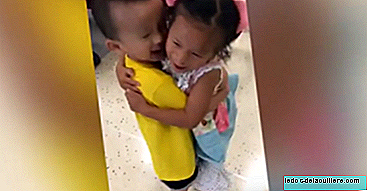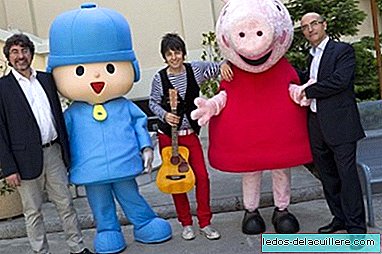
When talking about limitsWhen we want to give our children a upbringing that respects their needs, we can encounter many dilemmas. We do not want to limit their freedom to be, nor that they are able to trust us, nor impose our customs at the expense of their real needs. But we also don't want to confuse and raise savages without respect for others, or empathy more than for themselves, or rude children who don't know how to behave.
Limits, the famous limits, they become, for many parents, a problem. Setting boundaries is something they fear doing, as if guiding their children was equivalent to authoritative upbringing. Not knowing the difference between real and organic and secondary needs is the big dilemma.
That fear is legitimate. If we feel that we have grown without freedom and educated by fear and threat, the limits frighten. If we do not want that for our children we can fall into the error of ignoring that children need the limits to develop healthily as much as they need respect, empathy and the freedom to be children and be themselves.
Organic boundaries and cultural boundaries
A baby is pure instinctive need. Do not control your need, or see it as an attempt at manipulation.
Not offering the necessary attention, not only in their physical needs for care and food, but also for unlimited contact, affection, hugs and caresses, can damage them deeply. Babies don't ask for anything they don't needIn fact, what they ask is to be attached to our body and receive stimuli or rest.
For a baby there are no limits, you need arms, chest and absolute delivery. We are his habitat and he is not aware of his existence outside of us, as a being with two bodies, from which, at birth, he has not completely detached himself psychically. Everything in it is necessity and expression of need.
But that does not mean that we are going to become his reflection, that we cease all activity to stimulate them. It is not good for the child that his parents the only experience they offer is to stand before him and make monkeys. The baby, hung from the body of the mother or father sometimes, will also enjoy accompanying us in daily activity, the walk, the organization of the home and, as it happened in other cultures, at work.
Today, that children remain by our side while we work has become impossible in almost all activities. But, more than that, the model of a society made and designed for the concept of “masculine” work is worrying, with very long schedules that prevent children from spending most of their waking time with parents and are cared for by caregivers in groups, instead of individually.
The baby's needs are not limited
Living organisms have the necessary impulses to complete and acquire their natural abilities, so it is very important to let the little ones experience through their actions. But for the child to be able to make free decisions, they need a safe, limited physical and behavioral environment in which to exercise, both in the motor and in the emotional.
As the baby grows, he will discover the most important thing we have all discovered in life, the self. And then it will begin to show new skills in its relationship with the environment and also more complex new needs than physical contact.
They then begin to surface, parallel to the basic needs common to all living beings, substutive and secondary needs.
Limits and need in babies
Let's see this more clearly with an example. The hungry baby urgently needs to be fed. Delaying the intake for educational reasons or incorrect beliefs about the time of digestion of milk, only serves to make him suffer and can distort his way of perceiving even the way in which it is contemplated.
Yes your real need, painful, hungry, is not taken care of, the baby feels that his need is not so important for the person on whom he depends for everything, his appetite is modified, his confidence in the love he has the right to receive decreases and, let's say, we put In addition, obstacles to maintain breastfeeding if it is the form of food we offer.
In the same measure we must consider their needs for company in the dream or to be taken in arms. They are not questionable, they are not, of course, manipulations, they are natural impulses that are born from their pure and instinctive interior. They are good for them, they make them grow according to the pattern that their own nature sets them.
And while we have a baby the limits are something abstract, so culturally questionable, that we should not consider them as something to mark, because the same baby knows his body and his mind and is equipped with the tools to move in them. There will also be many unforeseeable circumstances, in which we will limit the immediate desirable fulfillment of those needs without having to set guidelines or times for the arms, sleep or milk.
The famous limits
But our baby will grow, and we will find ourselves with the need, the obligation as parents, to set limits, the famous limits, build them in a safe way, explain them as soon as the information for the child's mind is accessible, and later, as childhood progresses, reach an agreement to give our children the ability to build a true autonomous responsibility when they enter in adolescence
The baby will discover that he is not his mother, he will touch his body and hers, setting the first limits he will face: his self and the world. And with this, we will enter a new phase in which the limits will change. We will see in the following topic how to discover them with our children and how to begin to establish externally the necessary limits learning to read in the behavior of the children.












